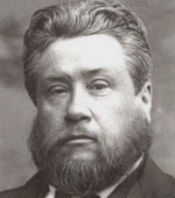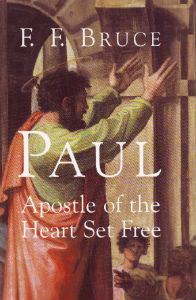 Charles Spurgeon
Charles SpurgeonBy Neil Earle
 Charles Spurgeon
Charles SpurgeonThe Book of Hebrews has been called “a gold mine for those who want to dig deeper” (New Bible Commentary). The great Victorian preacher Charles Spurgeon called it the “book of cautions” for its consistent warnings to Christians not to neglect their salvation, not to drift away and for its brief discussion of “falling away” from Christ.
Hebrews was regarded for centuries as St. Paul’s warning to Jewish Christians not to turn from the Church and revert back to Judaism. This theme still works.
Jesus predicted that there would be severe and bitter clashes between the Jewish synagogue and the young Church: “they will put you out of the synagogues…a time is coming when anyone who kills you will think they have offered a service to God” (John 16:1-2). This surfaced in the 80s AD in a legal ruling called The Eighteen Benedictions of the Jews which forbade “Nazarenes and heretics” to assemble with other Jews. It set in concrete a most unfortunate clash of two religions that have had devastating consequences – a major event in world history but not our subject today (George Beasley-Murray, Word Commentary on John, page 277).
The Hebrews are Jewish Christians who have already suffered persecution for the faith (12:4-7). By the First Century, the long-established Jewish religion had received exemption from certain Roman laws and penalties. Thus it would be natural to return to the synagogue during persecution over such matters as emperor-worship even though attacks on the young church had come from both Jewish and Gentile leaders (Acts 17:5).
Thus Hebrews is a strong call against drifting away, to “give the more earnest heed to the things you have heard” (2:1). A key word in this letter is “better.” Jesus is a better high priest, heads up a better temple, offers a better resurrection, provides a better hope and mediates a better covenant based upon better promises (8:6).
 Israel's tabernacle was only a pointer to greater realities.
Israel's tabernacle was only a pointer to greater realities.Paul’s strategy in the Hebrews letter is to show the clear superiority of Jesus Christ over the tabernacle system God had Moses erect in the desert (Hebrews 9). Even though his subject is Jesus we still find the Holy Spirit appearing in specific terms hard for Trinitarians to overlook.
But Hebrews 1:1:1 to 2:1-4 begins with what Donald Hagner calls “the seven glorious phrases” describing Jesus. These are Old Testament witnesses to the superiority of Jesus over all that has gone before – Jesus is begotten (not born) in Hebrews 1:8, he is clearly God’s Son worshipped by angels (1:5-6), angels serve him, his throne is forever, He laid the foundations of the earth and endures forever, He dominates any and all enemies (1:13).
This powerful testimony to Jesus starts with God (1:1) and climaxes with a reference to the miracle-making power of the Holy Spirit (2:4). Of course. That is exactly what we’ve come to expect in this series on the Holy Spirit – when God the Father and the Son are mentioned the Holy Spirit is not far behind.

The other references make the point that the Holy Spirit spoke the words of the Old Testament (3:7), makes us partakers of heavenly things (6:4-6), teaches such things as the ultimate meaning of the veil in the tabernacle (9:6-8), witnesses to Jesus’ ability to forgive sins (10:14-17), and defines turning from Jesus as an insult to the Holy Spirit.
Once again the threefold work of Father, Son and Holy Spirit flows through this major Biblical book, one that is full of advice for older Christians. Let’s look at these points on the Spirit individually.
The first reference in Hebrews 2:4 speaks about the manifestation of the Holy Spirit to these Hebrews in the form of “signs, wonders, various miracles and gifts of the Holy Spirit.” The early Jewish Christians surely saw lots of that when even Peter’s shadow passing over the sick apparently was used to heal people. Paul’s prayers struck down opponents with blindness, cast out demons and perhaps raised the dead (Acts 20).
Those were the kind of interventions the writer of Hebrews wants these people to remember. So we too should not forget the obvious mighty signs and interventions we see in our lives or in the lives of others. That can be part of our foundation for remaining loyal to God and Christ in tough times and prevent our drifting away from the truth as we have seen (to our sadness) many people do. So that’s very up-to-date.
Next in Hebrews 3:4-7 the Spirit is shown as the chief inspiration behind the powerful Word of the Old Testament. The writer enters into a discussion on the seventh day which was a question pivotal to Jewish identity in the First Century. It is clear from the context and from this verse that the day God is concerned about for all his people today is TODAY! That is what comes across powerfully in this passage where he reminds the Hebrews of the many rebellions of Israel in the wilderness. The message is for us – don’t give up what you already know about God and Christ – the Holy Spirit is a continuous prod to us if we don’t neglect hearing him regularly through the word of God.
 Even if Paul did not write Hebrews his ideas are its cornerstone.
Even if Paul did not write Hebrews his ideas are its cornerstone.Hebrews 6:4-6 comes in the middle of a section wherein Paul says it is impossible for those who were once enlightened by the Word and the Spirit “who have tasted the heavenly gift” to be renewed to repentance. This experience of being partakers of the Holy Spirit is a delightful recognition of the life-giving power of the Spirit that bubbles up inside actively engaged Christians. Here is a strong assurance of daily salvation and a constant and steady transformation of our minds and spirit from the way of selfishness to the paths of gentleness and peace and the good results which this reaps in our lives and the lives of the people with whom we come into contact.
But what of this impossibility of repentance that comes from those who “fall away.” Charles Spurgeon spoke on this in 1856 and even the compressed summary of his words are vitally relevant to us today. Let’s hear him out on this tense subject, the cause of so much anxiety among believers who see loved ones depart from the faith:
“There is a vast difference between falling away and falling,” says Spurgeon. “It is nowhere said in Scripture that if a man falls he cannot be renewed, the righteous man falls seven times but rises again.
“Falling is not falling away.
“It is the difference between someone in a dead faint and someone who is dead.
“There are Christians who have wandered into sin and not fallen away. Abram told Pharaoh that his wife Sarah was his sister but God forgave him. That is a sin by surprise but not falling away. A Christian may wander into sin for a time and be gone far from God but wanderer though he may be the mercy of God is not exhuasted. Think of David and Bathsheba. The word is still : ‘Return you backsliding children, says the LORD.’”
Then Spurgeon cites the case of a man who cursed and swore that he had never known the Lord. “The man you know, he is Peter, an old friend of ours” and a chance was given him for restoration at a memorable breakfast on the shores of Galilee.
Spurgeon concludes: “To fall way would be for the Holy Spirit to entirely go out of a man – for God who had begun a good work to leave off doing it entirely, to take his hand completely and entirely away, being hurled over a precipice where we are lost forever…I cannot describe it from observation for I have never seen a case of it yet.”
Wow! Isn’t that an eye-opener! What an assurance Spurgeon had that God never gives up on people, as far as he knew. He got in behind the meaning of Paul’s words in Hebrews 6 and applied his own pastoral experience of comforting the afflicted and strengthening weakened sinners or those so worried about loved ones by digging behind the kind of language and thought process Paul is using in Hebrews 6. Argues Spurgeon: Even if an astronomer calculated that the sun moving a million miles would scorch us all, that doesn’t mean that this event will really happen.
Similarly, says Spurgeon, “these are wise cautions in Hebrews…a rational way of speaking to show us how grateful we should be for the mercy and grace of God.”
He then adds. “There is a cup of sin which would poison thy soul, O Christian. Consider what grace it is which holds thy arm and will not let thee drink it.”
This is surely the wiser way for Christians to respond to the “wise cautions”in this sober book. And the Spirit will help us in this.
The other mentions of the Holy Spirit come in Hebrews 9:6-8 which shows the Spirit as the clear teacher of the church, as Jesus predicted.
We also get a reference to the plan of salvation as being Trinitarian in nature. Contrasting the Old Testament blood of bulls and goats in the sacrifices, Paul says “how much more shall the blood of Christ who through the eternal Spirit offered himself unblemished to God, cleanse our consciences …so that we may serve the living God” (Hebrews 9:14).
Some think the spirit here is what Jesus gave up on the cross but that is to miss what Donald Hagner sees as the deeper meaning of this verse – that is, the Holy Spirit as the Purifier of our inner conscience, “this cleansing penetrates to the inner recesses of our personhood and so involves far more than the cleansing of the flesh from ceremonial defilement” (Hagner, Hebrews in the New International Biblical Commentary, page 137).
The last “wise caution” is entirely appropriate in the light of the sermons given so far. Isaiah said the Spirit was grieved with Israel, Stephen charged the Pharisees with resisting the wise influence of the Holy Spirit, Paul in Ephesians said our conduct can "sadden” the Holy Spirit, and he now warns against insulting the Holy Spirit in Hebrews 10:28-29.
Of course. If we had a special gift or endowment given to us by a rich uncle it would be an insult to blow it all away on carelessness and dissipation. In the same way we should treasure and deeply cherish the transforming power God has made available through the Holy Spirit. It is truly the down payment, the first installment on our God-given claim to eternal life.
Thank God for the Holy Spirit.